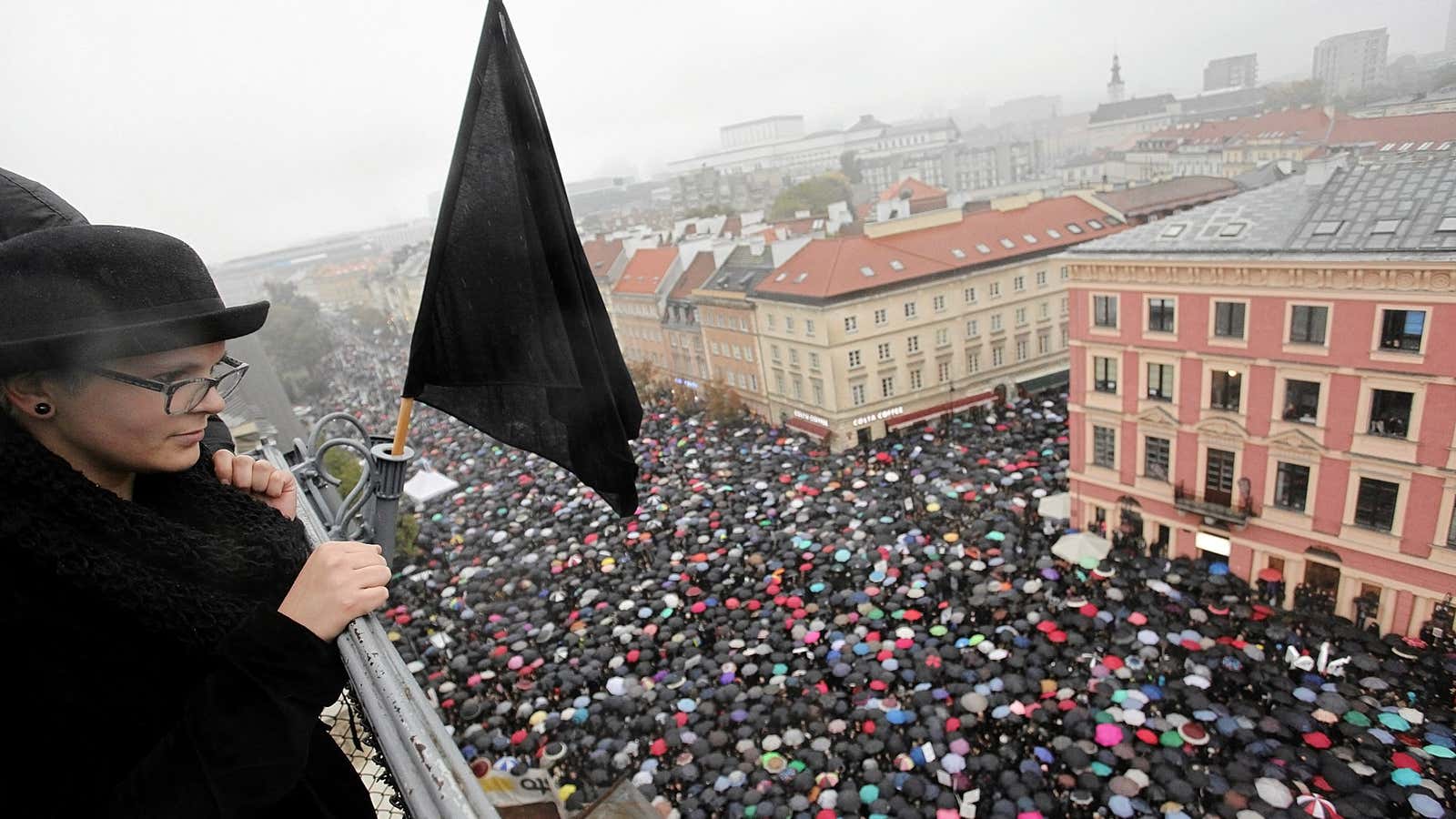Poland’s ruling conservative Law and Justice (PiS) party was humbled last week. After 30,000 people took part in nationwide “Black Monday” protests, ministers who once spoke out in favor of a near total ban on abortion scrambled to reject the highly unpopular proposal to do so. The “screams and chaos“ reported in parliament on Wednesday night were a far cry from the party chair Jaroslaw Kaczynski’s prior accusation that those who fight Catholic values in Poland “favour nihilism.”
But for the women who skipped work and classes to chant in the rain, it was a double victory. They had dealt PiS its first major blow as Poland’s ruling party and slapped the Catholic church in the face by showing that, even in a staunchly Catholic country like Poland, there were limits to how much church interference people would tolerate in politics and private life.
Yet in the midst of celebration, pro-choice activist Krystyna Kacpura remains soberingly practical. “We still have a long way to go,” says Kacpura, who directs the Federation for Women and Family Planning (Federa). Poland’s current abortion law, which bans abortions except in cases of rape, severe congenital defects or a threat to the mother’s health, is still one of the strictest in Europe.
According to policy analyst Janusz Bugajski, “it is highly unlikely for PiS to legalize abortion, as it is evident that religiosity and the implementation of Church teachings is one of its main planks.” Recent polls have indicated increasing support for liberalizing the existing law, so “much now depends on whether the re-energized opposition will push for liberalization of the existing law.”
In the meantime, “you can buy your reproductive rights in this country,” Kacpura says matter-of-factly, referring to Poland’s expensive and wildly hypocritical abortion underground, where doctors who speak out against abortion by day are rumored to fleece their patients for up to the equivalent of $1,200 dollars by night. Going abroad is comparatively cheaper and often preferred. However, according to Kacpura, “if you have a low economic status, and you live in a town with one pharmacy and one doctor, then you have no way, and it is extremely dangerous for these women if they turn to home remedies or unqualified practitioners.”
Some of these women may be better advised to turn to the shady trade of abortion pills. In the summer of 2015, a Dutch physician named Rebecca Gomperts stood in front of the river in Frankfurt and flew a drone filled with misoprostol and mifepristine (pills given to women in the first trimester to induce miscarriage) over to Slubice, Poland. There, women’s groups on the ground collected the pills, and the Polish government did not interfere.
Gomperts’ organization, “Women on Web,” is an online abortion service intended for countries where abortion is banned or highly restricted. In Poland, women cannot be prosecuted for taking the abortion pill, and Gomperts’ website gets 1,800 emails a month. “Actually, we get all kinds of questions,” Gomperts tells me. “Some women email about drinking bleach or jumping down stairs. We advise them on the safer options.”
The drone was a one-off (usually Gomperts delivers by mail, free of charge if necessary) and that day the German police turned up too late–though they managed to confiscate her controller. But Gomperts needed the publicity. While she’s figured out how to outsmart the law, she worries that women may also struggle to find ways to get in touch with her organization.
When you type “get an abortion in Poland” into Google search, dozens of websites come up offering abortion pills. But some of them are scams. Pro-life activists sell headache tablets or placebos (link in German) as misoprostol or mifepristine. “Many women don’t know about women’s NGOs, they don’t know our organization.” Gomperts tells me. “Who are we not reaching? It is the biggest question.”
It’s also the question that Krystyna Kacpura asks herself when the phone isn’t ringing at the Federa office in Warsaw. Now that the protests are over, the NGO has shifted its focus back to the daily grind, which includes running a support hotline for women. “I’m not sure if many of those who need abortions can find the right sources,” she confesses, adding that access to the Internet is also a factor, especially in rural areas.
Who are these abortion-seeking women who lack access to help networks, and what happens to them when something goes wrong? In hospitals, a doctor who suspects their patient has attempted an illegal abortion is obliged to call the police. But medical student and activist Martyna Edyta only knows of one case where this actually happened. It was when a girl put abortion pills in her vagina, and her doctor couldn’t overlook it, or write “spontaneous miscarriage” in her medical files.
So while Kacpura estimates 150,000 illegal abortions in Poland a year, no one knows how many women are injured or killed due to unsafe illegal abortions. International bodies such as the United Nations have repeatedly advised the Polish government to investigate this. The reason they have not done so, is, to Edyta, obvious. “If they look into these practices, they would have to admit that the current abortion law is not working,” she explains, “And then they would have to get rid of it.”
